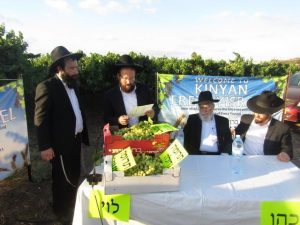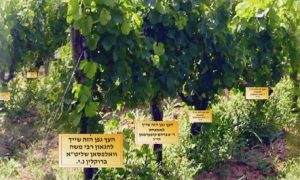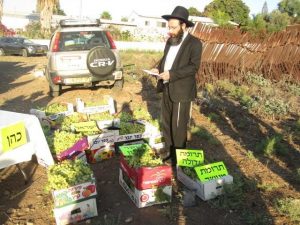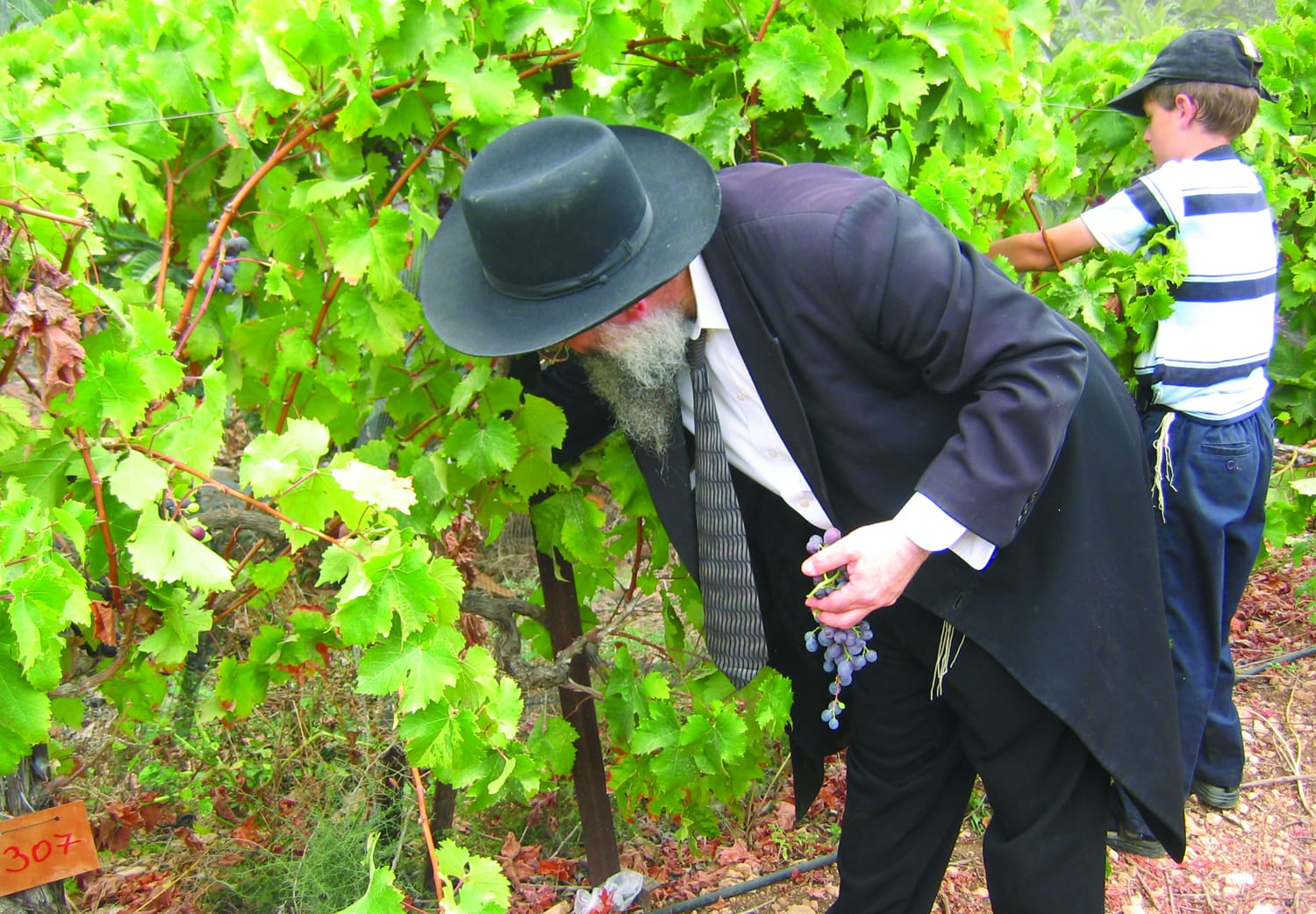I made aliya many years ago, and I have many unique experiences to share about the Land of Israel. This is just one of them, but it happened recently, and it unfolds almost like a mystery novel.
It began when I saw one of the locals here in Ramat Shlomo (a suburb of Jerusalem), a man who everybody in the neighborhood knows lives basically hand-to-mouth, sitting in front of a table outside one of the local shuls (which has a broad plaza in front of it), selling grapes. He had piles of grape cartons behind him, enough to fill a truck, and a scale in front of him, and was weighing out kilos of grapes to customers.
“You’ve entered the wholesale fruit business?” I managed to ask him.
“Once every few years,” he replied, busy as he was.
What? This didn’t make sense. An avreich, father of a large family, becomes an overnight fruit peddler? And what’s this “once every few years?”
“What’s going on?” I said to a friend I spotted, as I pointed in a general direction to the impromptu Machaneh Yehuda shuk that was in full swing by the shul.
“You don’t remember he did this a few years ago, too?”
“I must have missed it.”
“This is a maaser ani year [a year in which certain tithes of the harvest in Israel are given to the poor], and unfortunately, he qualifies as an ani [destitute man]. These grapes come from some organization that is mezakeh the bnei chutz laaretz with the terumot and maasrot, and he got the maaser ani [i.e., an organization that enables those living in the Diaspora to fulfill mitzvot usually reserved for those who actually live in the Land of Israel].
“What organization?”
“That’s all I know,” he said.
My curiosity was piqued. The neighborhood ani was still busy late into the night, but a few days later, I ran into him and asked him what was pshat. He knows me so I can kid around with him, as I did:

“Look, you’re a green grocer like I’m a brain surgeon. Ma pitom [what’s this all of a sudden] that you should be selling grapes by the kilo like in Machaneh Yehuda?
“The grapes came from an organization that is mezakeh the bnei chutz laaretz by doing the terumot and maasrot for them,” he replied.
“I know, that much I already heard, but how did all that produce make its way to you?”
“I was invited to come to the hafrashat maasrot for this year. One of the grape-pickers gave me a ride to Beit Uziel, a small town near the [Ben Gurion] airport. They have a vineyard there, and they trained the grape-pickers well. They first went around the vines and marked off the clusters that weren’t well formed, those are called olelot, and all the grapes that fell to the ground as they harvested, those were later picked up and brought top me also, those are peret. And they separated the tithes and I got my share — a few tons of grapes, literally. They sent me and the grapes home on a truck and helped me unload them near the shul. Whatever I didn’t sell that night I made into wine.”
“Who’s behind this organization?”
“I don’t know.”
“What do you mean, you don’t know? You were right there! Who spoke to you?”
“I don’t remember, but Rav Shaul Reichenberg was there.”
“Thank you, kol tuv,” I said. Now I had all the information I needed, or so I thought.
I went straight to the nearest beit midrash, because you see, Rav Shaul Reichenberg is the last word, but the last word, on mitzvot hateluyot ba’aretz [mitzvot that apply specifically to the Land of Israel, such as tithing of produce and the Sabbatical year]. How I know about Rav Reichenberg is a story in and of itself. You see, in Israel, the fruits and vegetables are holy, either d’Oraita or d’Rabanan, but tithes have to be taken. Now, if you’re in a religious area, a hech’sher of some sort has already taken care of that, although many people are stringent to tithe again at home, without a blessing. In my case, once upon a time, I was offered a bag of lemons that came from a neighbor’s tree, and these were not maasered by anyone — what’s known as tevel gamur. He had given me from his tree before, but that was during the shemita [Sabbatical] year, when all the fruits are hefker [halachically ownerless] and don’t need to be maasered. This time I was in trouble, as my wife wanted to use the lemons, but I had no idea how to do a “real” tithing (i.e., not as a stringency). How much should I separate, and would that amount have enough value so that the maaser sheini could be redeemed onto a coin, or if I needed a peruta chamura (a coin that is necessary if only small amount of fruit is being tithed)? With these and other questions in mind, I took a volume of Rav Shaul Reichenberg’s sefer from the shelf of the beis medrash, found his phone number on the front page, called him up and got all the answers I needed. He even let me use his peruta chamura for the redemption …).
That was many years ago, but I found the number, called again and asked Rav Reichenberg what he knows about an organization that is mezakeh the bnei chutz laaretz with the mitzvot of terumot and maasrot.
“Of course, you’re talking about Kinyan Eretz Yisrael. It’s an organization that was started 13 years ago to be mezakeh the bnei chutz laaretz with the terumot and maasrot.
I thought Rav Reichenberg was being modest.
“The Rav founded it, I understand?”

“Me, ma pitom!” (How I love it when an international halachic authority is also a down-to-earth guy). “Rav Meir Leibowitz founded it and is still running it. I oversee what goes on each time they go out to the field to separate the terumot and massrot, though.”
Rav Leibowitz? Where did I know that name? I thought to myself.
“Who is Rav Leibowitz,” I asked, although I felt funny chatting with a leading halachic expert over the phone, even if he is down-to-earth.
“Rav Leibowitz is a dayan [rabbinical judge] in Ramat Shlomo.”
Him? I was shocked. I know Rav Leibowitz!
“Rav Leibowitz heads an organization that is mezakeh the bnei chutz laaretz with the terumot and maasrot?” I was almost screaming by now.
“First of all, relax. Rav Leibowitz has been running Kinyan Eretz Yisrael for years already.”
“Thank you, kevod harav. Kol tuv,” and with that I hung up, and was really confused. A dayan who handles monetary cases in Ramat Shlomo, the kind who spends his days and nights poring over the Talmud and Shulchan Aruch. He heads an international organization, and in such a different field? If you had told me that the neighborhood ani is the president of some leading corporation, I wouldn’t have been more surprised.
I know Rav Leibowitz, and I sometimes chide him over his bookishness, the way I was able to chide the ani, so I asked him:
“Excuse me, k’vod harav, but may I ask: Do you by any chance head an international organization that is mezakeh the bnei chutz laaretz with the terumot and maasrot?”
He smiled. “And if I do?” he asked.
“Uhhm, listen, you’re the head of an international organization like I’m a brain surgeon (I said I could get away with such statements). What’s pshat?”
“I had a dream, and I still have it, of bringing the mitzvot of Eretz Yisrael to all Jews of the diaspora. There was a time when I went abroad and sold sections of a field in Mazkeret Batya and a vineyard in Beit Uziel. Contracts were drafted so they were under the ownership of Jews from abroad, who became members, and every year, they have the merit of the mitzvot of tithes. I can’t travel abroad like that anymore, but we still go every year to do the tithing, and if it’s a maaser ani year, like this year, so, you saw what happened recently with the grapes.”
Yes, the grapes, that’s how this mystery started, I thought to myself.

“But it’s much more than that,” Rav Leibowitz added. “We’ve made textbooks on the mitzvot hateluyot baaretz, and some schools here have adopted it. We are trying to introduce get this subject in the curriculum of schools in America, too. We have to raise awareness about it. People abroad buy Jaffa oranges, or other Israeli produce, and they should know what to do, just like we sometimes have to take tithes here, or we do so as a stringency, they can do so there. You were never given something that needed to be maasered?”
“Uhhm, as a matter of fact…” I thought to myself.
“These exceptional mitzvot, which are part of our daily life, should be part of their daily life, too. That’s always been my vision.”
“And how do members know that you’re really doing the maasering?” (Like I said, only I can get away with such chutzpah).
“We have it all on video, which they can access on our site. But we hope soon to give members much more than that.”
“Like what?”
“Like a package of matza for Passover from their own wheat, grown in Mazkeret Batya, or a bottle of wine from the grapes of their section of the vineyard in Beit Uziel. This is their land, too, and these mitzvot are available to them. That’s the idea. Let them own a tree here and we will take care of the tithes for them, or adaraba [on the contrary], let them fly in for harvest season and do the tithing themselves. Why not?”
You could have knocked me over with a feather. You have to see the man I was speaking with. So unassuming, so engrossed in his learning, and yet such an idealist. And here in the neighborhood, no one knows anything about this international “side project” of his. That’s Eretz Yisrael for you!
The words of this author reflect his/her own opinions and do not necessarily represent the official position of the Orthodox Union.

